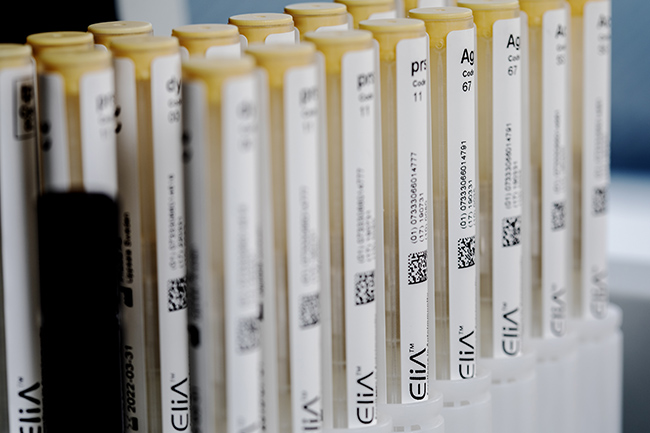
ImmunoCAP™ blood tests:
Your step-by-step guide to implementing specific IgE blood tests in clinical practice
ImmunoCAP blood tests: allergy diagnostics
As the gold standard for specific IgE blood tests,1 ImmunoCAP tests offer high performance and reliable results.2
Unlike traditional skin-prick tests, ImmunoCAP tests can be performed irrespective of age, disease activity, skin condition, medications, or pregnancy. They also pose no risk for anaphylaxis.3
To implement ImmunoCAP blood tests in your clinical practice, follow these simple steps:
Request an ImmunoCAP test
for the relevant allergens (defined according to symptoms, age, and local sensitisation patterns) at your local pathology laboratory.4
The laboratory will perform the requested blood test
(2.5 mL whole blood or 1 mL serum).
You and your patients will then get sent a digital report
with the precise test results, for personalised patient management.
How to read and interpret ImmunoCAP test results
When you receive your patient’s specific IgE blood test results, they should be interpreted in conjunction with the clinical history and physical examination.5,6
ImmunoCAP blood test results will indicate whether the patient is sensitised (has IgE antibodies) to specific allergens. However, sensitisation to specific allergens does not always mean the patient has an allergy, as sensitisation does not always result in symptoms.7 Allergy is the symptomatic response to allergen(s) that an individual is sensitised to.3 The higher the specific IgE antibody concentration, the higher the risk of allergy.8
Reading the results: how to spot sensitisation
- Positive test result: specific IgE values of ≥0.10 kUA/L indicate sensitisation.7
- Testing total IgE alone could be of limited benefit and may lead to the mistaken assumption of allergy as the cause of symptoms if elevated.6
Interpreting the results in conjunction with the clinical history: how to spot allergy
- Symptoms without specific IgE sensitisation → allergy to the specific allergen excluded as the cause of symptoms.7
- Specific IgE sensitisation without symptoms → allergy to the specific allergen excluded at present.9 However, consider the fact that an allergy may develop in the future, or that the patient has outgrown their allergy.7
- Symptoms with sensitisation → IgE-mediated allergy confirmed.3
Specific IgE blood tests can help you diagnose or rule out an allergy, thereby directing your next steps in the management plan for your patient.6
Compared with a clinical history and physical examination, additional use of ImmunoCAP blood tests provides a more reliable diagnosis:10*
*Based on a prospective multicentre study of 380 children aged <6 years with symptoms of eczema and/or wheezing/asthma and/or rhinitis.10
Referral to specialist centres will be necessary in certain cases, such as when there is a discrepancy between the clinical history and specific IgE results.3,6
Where allergy has been confirmed, specific IgE can help pinpoint the causative allergen(s), thus allowing you to:4
- Advise your patient on allergen avoidance
- Determine appropriate pharmacotherapy
- Identify patients at increased risk for development of further allergic diseases
- Consider allergen immunotherapy (usually initiated by allergy specialists)
Even in the absence of allergy, specific IgE antibodies could:7
- Be a memory of a previous allergic status
- Be a risk factor for future development of allergy
Requesting follow-up tests: spotting the development of allergy
As allergies change over time,11 regular follow-up tests of specific IgE could help you appropriately adapt the management of your patient by detecting:
- Whether levels of sensitisations to specific allergens have changed
- Whether new sensitisations/allergies have developed
IgE: immunoglobulin E; kUA/L: allergen-specific kilo units per litre
- Crameri, R (2014). In vitro allergy diagnosis – allergen-specific IgE. In: Akdis C A, Agache I. EAACI Global Atlas of Allergy. Zurich: European Academy of Allergy and Clinical Immunology, 166-167
- van Hage M, Hamsten C, Valenta R. ImmunoCAP assays: pros and cons in allergology. J Allergy Clin Immunol 2017;140(4):974-977
- Siles R I, Hsieh F H. Allergy blood testing: a practical guide for clinicians. Cleve Clin J Med 2011;78(9):585-592
- Eigenmann P A, Atanaskovic-Markovic M et al. Testing children for allergies: why, how, who and when: an updated statement of the European Academy of Allergy and Clinical Immunology (EAACI) Section on Pediatrics and the EAACI-Clemens von Pirquet Foundation. Pediatr Allergy Immunol 2013;24(2):195-209
- Bousquet J, Anto J M et al. Allergic rhinitis. Nat Rev Dis Primers 2020;6(1):95
- Scadding G K, Scadding G W. Diagnosing allergic rhinitis. Immunol Allergy Clin North Am 2016;36(2):249-260
- Popescu F D, Vieru M. Precision medicine allergy immunoassay methods for assessing immunoglobulin E sensitization to aeroallergen molecules. World J Methodol 2018;8(3):17-36
- Soderstrom L, Kober A et al. A further evaluation of the clinical use of specific IgE antibody testing in allergic diseases. Allergy 2003;58(9):921-928
- Ansotegui I J, Melioli G et al. IgE allergy diagnostics and other relevant tests in allergy, a World Allergy Organization position paper. World Allergy Organ J 2020;13(2):100080
- Niggemann B, Nilsson M, Friedrichs F. Paediatric allergy diagnosis in primary care is improved by in vitro allergen-specific IgE testing. Pediatr Allergy Immunol 2008;19(4):325-331
- Zheng T, Yu J et al. The atopic march: progression from atopic dermatitis to allergic rhinitis and asthma. Allergy Asthma Immunol Res 2011;3(2):67-73
- Sampson H A. Utility of food-specific IgE concentrations in predicting symptomatic food allergy. J Allergy Clin Immunol 2001;107(5):891-896



